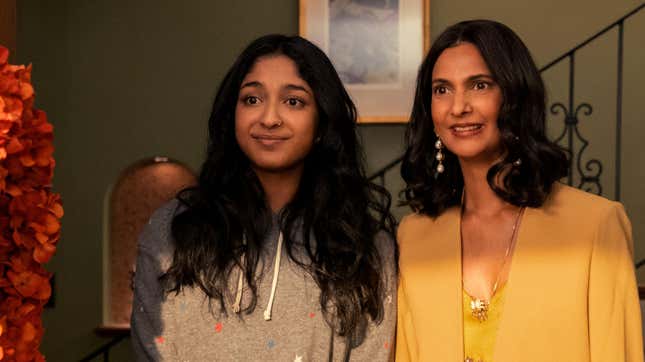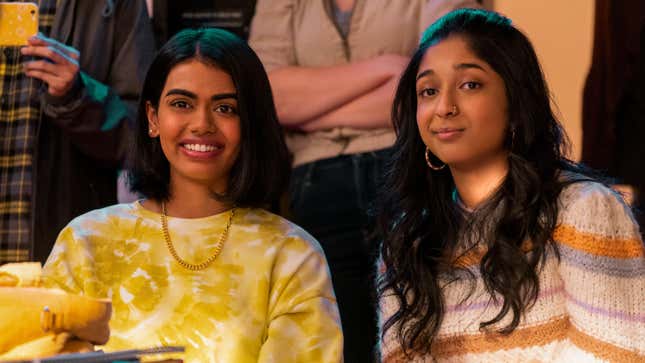
Maitreyi Ramakrishnan quickly proved her mettle in the debut season of Never Have I Ever, the Netflix coming-of-age dramedy, giving one of our favorite performances of 2020 as Devi, a 15-year-old grappling with the sudden loss of her father, Mohan (Sendhil Ramamurthy). In the breezy second season, Ramakrishnan finds even more nuance and vulnerability in her character without losing her impeccable comic timing. Devi’s grief still manifests through a gamut of rage-filled emotions, which she channels while trying to balance a love triangle, a new frenemy, and clashes with her strict mother, Nalini (Poorna Jagannathan).
Devi’s desire to be understood and well-liked—a feeling she experienced mostly through Mohan, who lovingly called her his “perfect girl”—continue to drive her questionable choices. She’s messy and flawed, but that’s what makes her deeply relatable. Ramakrishnan’s confident, empathetic performance makes it easy to root for Devi despite her ability to self-sabotage. Like Euphoria’s Rue Bennett and Julie And The Phantoms’ Julie Molina, Devi’s mourning fuels an identity crisis.
Never Have I Ever manages to distinguish its heroine (and itself) because it’s the rare show to spotlight an Indian American family. Co-created by Mindy Kaling and Lang Fisher, the series’ lighthearted humor and quirky character traits are reminiscent of The Mindy Project. Kaling was called out for the lack of South Asian representation on her previous show, but here she draws from real-life experiences. Never Have I Ever’s greatest asset is its exploration of the Vishwakumar family dynamics, which now includes Nalini’s kindhearted mother-in-law, played by Ranjita Chakravarty. Through Devi, Nalini, and cousin Kamala (Richa Moorjani), the show examines and subverts stereotypes instead of simply tacking them onto the characters. NHIE doesn’t try to represent an entire and richly diverse community, but it does tell a range of stories about women’s troubles and joys. Kamala battles sexism and misogyny while working with white male colleagues, and there are hints of a love triangle of her own with boyfriend Prashant (Rushi Kota) and Devi’s English teacher, Manish Kulkarni (Utkarsh Ambudkar).
Nalini can easily be categorized as a typical Asian helicopter parent, but NHIE thoughtfully threads the needle by delving into how she is moving on after the death of her husband, especially as she considers dating fellow dermatologist Dr. Jackson (Common). The two actors have zero chemistry, thanks to Common’s laborious performance, but this arc does give Jagannathan, the show’s MVP, room to expand on the depths of Nalini’s grief and loneliness, as well as her parenting techniques. Nalini and Devi’s different world views—Mom prefer her daughter’s focus to be on getting into Princeton instead of making out with her crushes—still set the stage for friction in the household, particularly when Devi accidentally bullies a friend or spies on Nalini. Their interactions are layered with sarcasm and tearjerking sentiment, proving that the mother-daughter duo remain the heart and soul of the show.
Unfortunately, season two spreads itself thin with subplots, which takes away from meaningful time spent with the Vishwakumars; there’s also a serious lack of Ramamurthy as Mohan in flashbacks. Devi, who spent a ton of time trying to hook up with hot swimmer Paxton Hall-Yoshida (Darren Barnet) ends up also falling for her nerdy nemesis, Ben Gross (Jaren Lewison). The second season kicks off with a very CW-esque love triangle sure to spark more debates about Ben versus Paxton. Devi thinks she can handle dating them at the same time without the other finding out. They obviously find out, and once again, Devi’s selfish decisions end up hurting and alienating the ones she loves, so she spends the rest of her time trying to get back into their good graces.

Things get complicated when Aneesa (Megan Suri) enrolls in her school. Aneesa is refreshingly easygoing and friendly, so she is instantly liked by her peers and teachers alike. Devi isn’t the only Indian kid at Sherman Oaks anymore, and she doesn’t know how to process this fact. Season one’s fourth episode, “...felt super Indian,” established that Devi doesn’t hang out with fellow Indian kids unless her mother takes her to festivals and cultural celebrations. Aneesa’s presence threatens her social standing—the old “there can only be one of us” mentality—but it’s also confusing for Devi because she finally has an acquaintance who can grasp the nuances of her life like none of her other friends, including having a tough mother who simply loves curfews or how to delicately handle extended relatives and nosy aunties. NHIE sets up a fascinating journey for Devi as she reckons with her harmful behavior towards Aneesa.
What’s especially compelling about the second season is the fact that no one lets Devi off the hook for her actions. She’s actually held accountable by her family members, her best friends Eleanor (Ramona Young) and Fabiola (Lee Rodriguez), the two boys she juggles, and even her favorite professor Mr. Kulkarni. The show doesn’t brush past her misdeeds but lets Devi confront the root of her chaos: her depression and inability to cope with any kind of loss. After being branded as “Crazy Devi” by everyone she knows, the second half of the season evolves poignantly with a sharp focus on her well-being. Her sessions with her therapist, Dr. Jamie Ryan (a sublime Niecy Nash), are pivotal to her growth. It’s exhilarating to watch a show about an Indian American teen delving into mental health (still an underexplored subject for TV) and the benefits of therapy in the diaspora. Ramakrishnan does justice to Devi’s emotional upheaval when she slips off her character’s vexed, determined façade.
Devi’s weighty, remarkable path to maturity is the highlight of season two, but NHIE remains joyful, full of witty one-liners and fun performances. Rodriguez and Young are somewhat sidelined by all that goes on, but they make the most of their time. Suri brings lots of charm to her role and fits seamlessly into the show’s vibe. Unfortunately, the show doesn’t address the dissonance of a career-driven, independent woman like Nalini, who wants her daughter to get into an Ivy League school, pressuring Kamala to get married. Tennis player John McEnroe returns to narrate Devi’s inner thoughts, but though the schtick worked previously, once it was revealed that McEnroe was Mohan’s favorite athlete, there’s still a disconnect in having an old white man chronicling Devi’s life. The first half does tend to feel repetitive of Devi’s season one issues, but the payoff is well worth it. Never Have I Ever is ultimately about her coming-of-age, and season two tackles it with vibrancy and much-needed introspection.